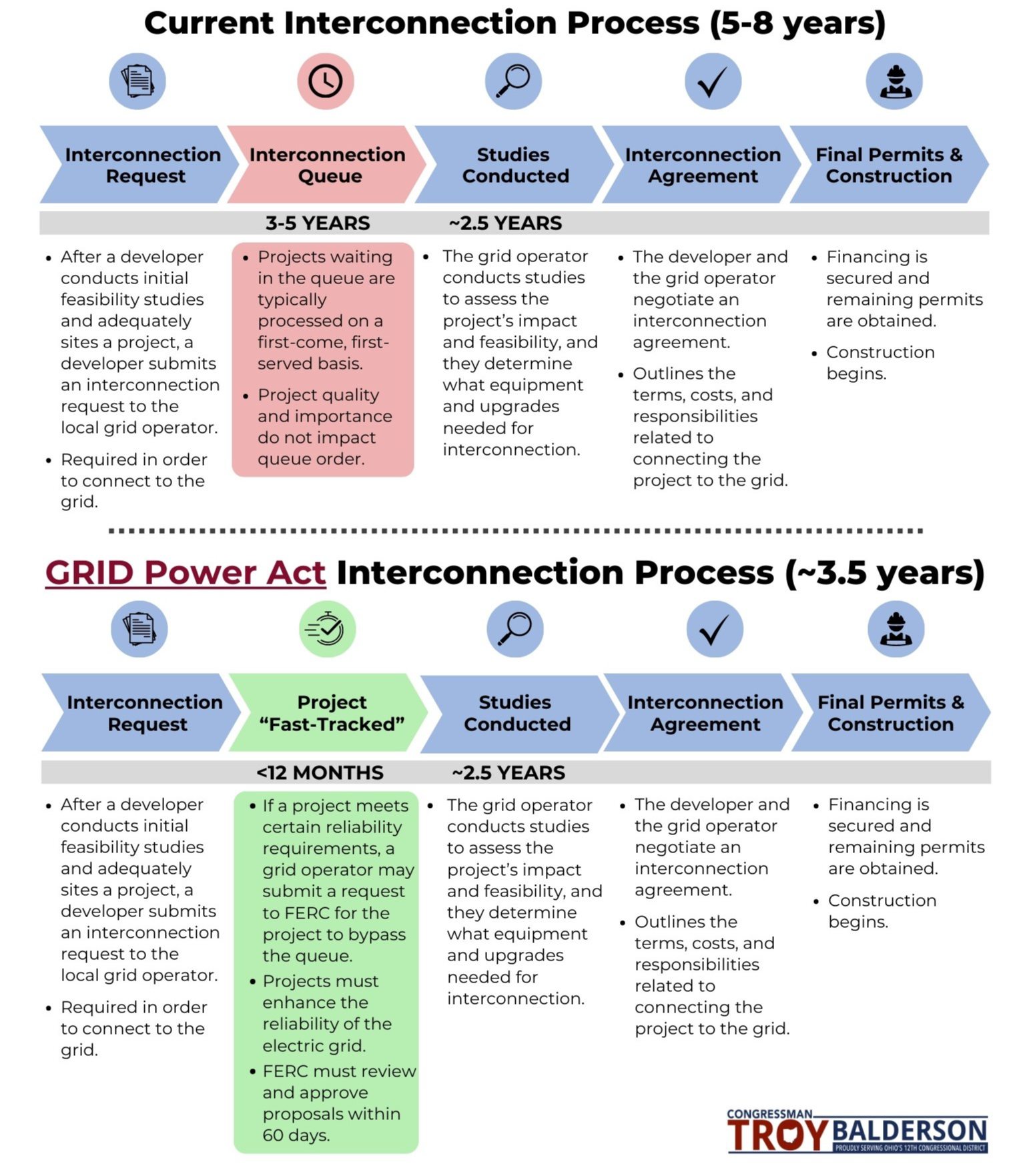WASHINGTON, D.C. – U.S. Representative Troy Balderson (OH-12) reintroduced legislation today that would enable grid operators to expedite consideration of power generation projects that improve the reliability of the electric grid. U.S. Senators John Hoeven (R-ND) and Todd Young (R-IN) introduced identical legislation in the Senate.
The Guaranteeing Reliability through the Interconnection of Dispatchable (GRID) Power Act would allow certain projects, at the request of the grid operator, to bypass the overwhelmed interconnection queue. In 2023, the median wait time grew to five years, delaying critical projects from being built and connected to the grid.
“Our interconnection queue is buckling under its own weight,” said Balderson. “Transmission providers are tasked with ensuring we have enough electricity to keep the lights on, but the growing backlog of projects is adding years to an already time-consuming process. This legislation would give grid operators the authority to identify and expedite the consideration of essential projects that will protect our grid’s reliability and provide the power needed to meet America’s growing demand.”
“The reliability of the electric grid has been undermined for years by Green New Deal policies advanced under the Obama and Biden administrations, whose heavy-handed approach to regulation has forced the retirement of critically-needed baseload power plants. The result is an unstable grid, power shortages and more brownouts and blackouts,” said Senator Hoeven. “Our legislation seeks to reverse this trend by empowering grid operators to put baseload power generation projects at the front of the line for approval. Further, it sets deadlines for FERC, requiring the agency to promptly set up this priority approval process and to start acting on baseload power projects. Doing so will enhance our nation’s energy security and help ensure the power stays on when needed most.”
“Bureaucratic delays are slowing critical power projects and threatening the reliability of our electric grid,” said Senator Young. “We need to cut through red tape to get more power online faster. This bill will strengthen our grid to promote American energy independence and drive economic growth—especially in states like Indiana, where reliable energy is vital to jobs and Hoosier workers.”
The interconnection queue has become inundated with proposed projects seeking to capitalize on the Biden Administration’s taxpayer-funded "green" energy credits. These projects, which now make up 97% of all projects in the queue, tend to be weather-dependent and cannot be dispatched at a moment’s notice to meet consumer energy needs. As power demand in Ohio and across the nation grows at a historic pace, the grid will require more dispatchable baseload energy to avoid rolling blackouts and power shortages.
The previous Administration issued new rules, such as the Clean Power Plan 2.0, in an attempt to accelerate the retirement of American power plants currently responsible for providing much of the United States’ baseload power. The GRID Power Act would bring more baseload power generation online in a timely manner, leading to the long-term stability of the American electric grid.
“Significant increases in electricity demand are expected in every region of the country, driven by data centers powering advancements in AI, domestic manufacturing, and the electrification of various sectors of the economy,” said Todd Snitcher, President & CEO of the Electric Power Supply Association (EPSA). “Grid operators should be given significant flexibility to address current or future reliability concerns, including the creation of an accelerated interconnection for resources identified as critical to maintaining reliability. The bill appropriately requires stakeholder feedback and FERC approval before any changes are made, ensuring that all viewpoints are heard. EPSA is grateful to Congressman Balderson and Senators Hoeven and Young for their leadership on this critical issue and their commitment to electric grid reliability.”
“AXPC applauds Congressman Balderson, Senator Hoeven, and Senator Young’s efforts to prioritize projects that enhance grid reliability and capacity,” said Anne Bradbury, CEO of the American Exploration & Production Council (AXPC). “As our nation's power demand continues to rise, it is critical that we don’t delay consideration of power-generation projects, such as those that use natural gas, that can provide needed dispatchable power and enhance reliability.”
“We applaud Congressman Balderson for the GRID Power Act and for pushing reforms and finding solutions to ensure a strong energy future,” said Rob Brundrett, President of the Ohio Oil and Gas Association (OOGA). “This legislation will benefit Ohio’s energy consumers and help stabilize our energy grid. OOGA strongly supports Congressman Balderson’s efforts to prioritize reliable, abundant and easily dispatchable natural gas to power our homes and businesses by bringing innovative ideas to the queue reform process.”
“Electrical grid reliability is a critical issue for Ohio’s economy, especially as we emphasize advanced manufacturing and energy-intensive advancements in technology,” said Ohio Chamber of Commerce President & CEO Steve Stivers. “Legislation like the GRID Power Act will serve to expedite power generation projects that can improve the resilience and reliability of energy supply for the economy of the 21st Century. We thank Congressman Balderson for his leadership in addressing the critical energy needs of American businesses and consumers, and look forward to working with him to advance this common-sense proposal.”
"As the debate over generation adequacy continues within the 13-state grid region served by PJM Interconnection, Ohio manufacturers believe competitive markets will best respond to future load growth and demand,” said Ryan Augsburger, President of The Ohio Manufacturers’ Association (OMA). “OMA supports queue reform to more quickly and efficiently interconnect generating resources to the grid. Representative Balderson’s bill is a good first step toward reform.”
The GRID Power Act
The GRID Power Act directs the Federal Energy Regulatory Commission (FERC) to develop rules that authorize grid operators–Regional Transmission Organizations (RTOs) and Independent System Operators (ISOs)–to "fast-track" critical projects that ensure grid reliability and meet growing power demands by allowing them to bypass the years-long wait in the interconnection queue.
Under the legislation, grid operators would still be required to conduct feasibility and system impact studies on the generation projects before signing an interconnection agreement. The bill also promotes transparency by requiring the operators to provide a process for public comment and stakeholder engagement before submitting proposals to FERC and requires operators to provide regular reports on the state of grid reliability to FERC. This legislation empowers grid operators to accelerate projects that:
- Provide new dispatchable power and improve grid reliability and resource adequacy;
- Address power shortages caused by retiring or offline dispatchable power; and/or
- Support increased power demand.
FERC would be required to review and approve "fast-track" proposals within 60 days, potentially reducing the total time to approve these projects from years to just 12 months. Upon enactment, this legislation would require FERC to start the rulemaking process for this mechanism within 90 days of the bill's enactment and finalize the rules within 180 days.
Full text of the GRID Power Act can be found HERE.



